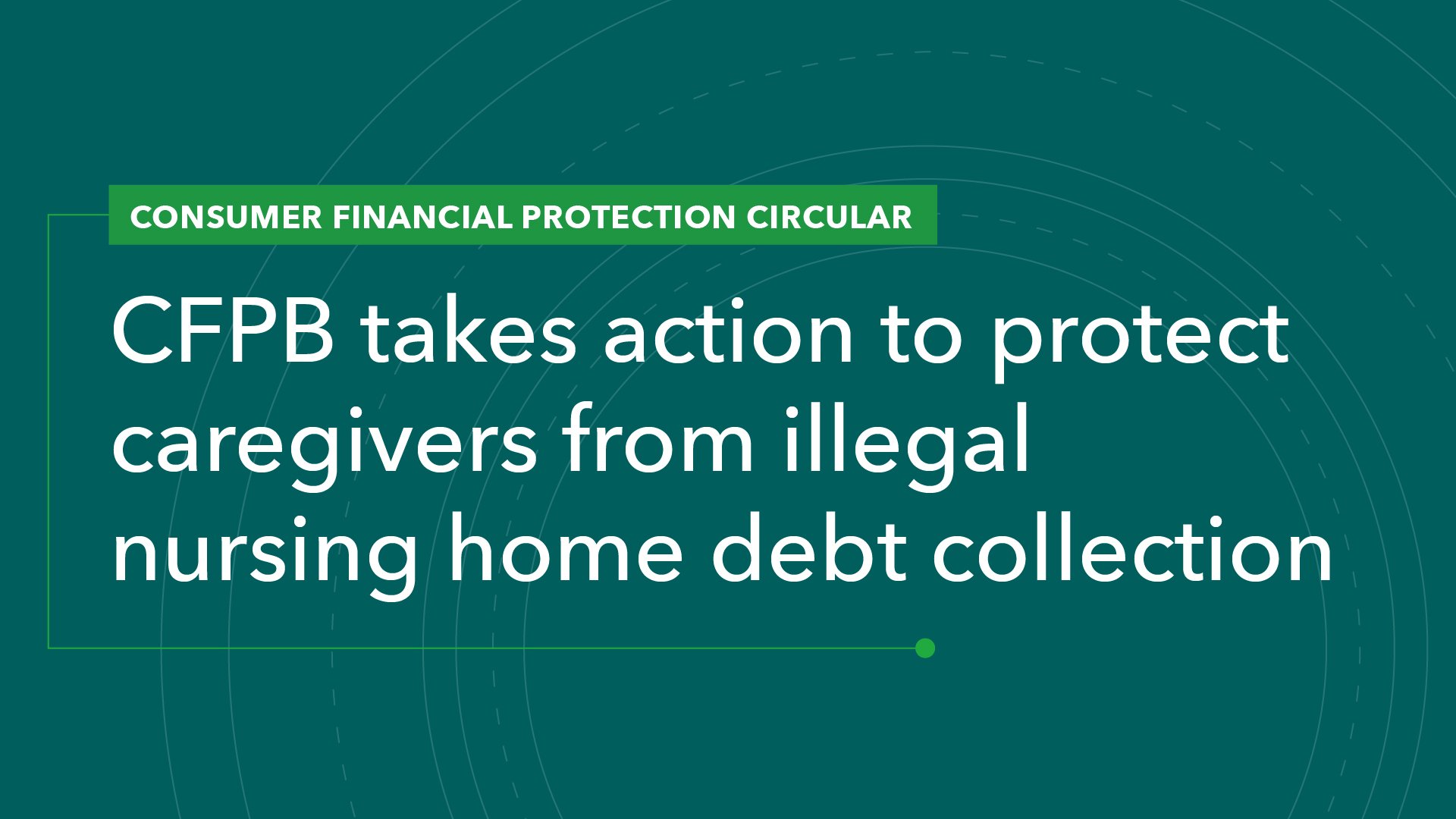WASHINGTON, D.C. – Today, the Consumer Financial Protection Bureau (CFPB) released an Issue Spotlight highlighting some of the difficulties and experiences heard from caregivers about being pursued over friends’ or family members’ alleged debts from nursing home facilities. Based on the findings in the report, the CFPB and the Centers for Medicare & Medicaid Services (CMS) have issued a joint letter confirming that a nursing care facility may not require that a third-party caregiver personally guarantee payment of a nursing home resident’s bills as a condition of the resident’s admission to the facility. Such conditions violate the Nursing Home Reform Act and, as discussed in a new Consumer Financial Protection Circular issued today, subsequent attempts to collect debts from caregivers may violate the Fair Debt Collection Practices Act and the Fair Credit Reporting Act.
“Nursing homes that participate in Medicare and Medicaid are prohibited from forcing a resident’s family or friends to assume responsibility for the cost of care as a condition of admission or continued stay in the facility,” said CFPB Director Rohit Chopra. “Debt collectors must take steps to ensure they are not violating the law by collecting on invalid nursing home debts.”
The Issue Spotlight, “Nursing Home Debt Collection,” explores how questionable contract provisions and debt collection tactics affect caregivers. Caregivers have been subjected to wage garnishment and have even lost their homes after being pursued by nursing homes for debts associated with family members’ or friends’ costs of care. The report finds that many facilities include clauses in admission contracts that require caregivers to be a “responsible party” for the resident’s costs of care, or that otherwise subject the caregiver to financial liability should the admitted resident incur a debt.
Consumer Financial Protection Circular
The CFPB also issued a new Consumer Financial Protection Circular today. The circular confirms that debt collectors can violate the Fair Debt Collection Practices Act and Fair Credit Reporting Act when they attempt to collect a nursing facility debt from a caregiver based on contract terms that are invalid under the Nursing Home Reform Act.
While the CFPB does not enforce the Nursing Home Reform Act, contract terms that violate the Act’s ban on requesting or requiring a third-party guarantee of payment are unenforceable. This means that subsequent collection of debts from those contracts may violate the consumer financial protection laws the CFPB does enforce, including the Fair Debt Collection Practices Act and its prohibition of “any false, deceptive, or misleading representation or means in connection with the collection of any debt.”
The prohibition on misrepresentations includes stating a consumer must pay a debt that arises from a contract provision that is illegal and unenforceable under federal or state law. A debt collector that attempts to compel a caregiver to pay a nursing facility resident’s debt may violate the prohibition on misrepresentations where the debt is invalid under the Nursing Home Reform Act. Nursing facilities that participate in Medicare or Medicaid are subject to the Act’s prohibitions on requesting or requiring a caregiver guarantee payment as a condition of admission, expedited admission, or continued stay in the facility.
Joint Letter
The CFPB has also issued a joint letter with CMS to remind nursing home facilities and debt collectors of the Nursing Home Reform Act’s prohibitions against requiring third-parties to personally guarantee payment to a facility as a condition of a resident’s admission or continued stay in the facility. Such contract conditions are unenforceable, and when nursing home facilities hire debt collectors to collect debts from third-parties, those debt collectors may violate the Fair Debt Collection Practices Act by attempting to collect debts that are invalid. The debt collectors may also violate the Fair Credit Reporting Act by furnishing information regarding such invalid debts to consumer reporting agencies.
Read the joint letter with HHS .
Congress created the CFPB’s Office of Financial Protection for Older Americans to help older consumers make sound financial decisions as they age, identify and address emerging consumer protection risks, and coordinate these consumer protection efforts with other federal agencies and state regulators to promote consistent, effective, and efficient enforcement. Since its inception, the office has assisted caregivers supporting older Americans and published research reports, including a recent data spotlight on medical debt among older adults. The CFPB has developed resources for older adults and caregivers on consumer financial protection.
Consumers can submit complaints about their debt collection issues by visiting the CFPB’s website or by calling (855) 411-CFPB (2372).
The Consumer Financial Protection Bureau is a 21st century agency that implements and enforces Federal consumer financial law and ensures that markets for consumer financial products are fair, transparent, and competitive. For more information, visit consumerfinance.gov.
Official news published at https://www.consumerfinance.gov/about-us/newsroom/cfpb-takes-action-to-protect-caregivers-and-families-from-illegal-nursing-home-debt-collection-practices/
Images courtesy of PixaBay
The post CFPB and Centers for Medicare and Medicaid Services Take Action to Protect Caregivers and Families from Illegal Nursing Home Debt Collection Practices first appeared on RSVTV news.
originally published at Finance - RSVTV news

